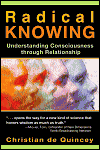
This is a good book by a professional philosopher who might have saved himself a lot of work by going to a year’s worth of sabbats and esbats with a friendly and thoughtful (dare I say scholarly?) pagan group and participating in a drumming circle for a couple of years. As described in the first chapter, the life of a philosopher is a disputatious one. Never coming to know—much less love—Sophia Herself, the philosopher spends all his time in a grim, intellectual search for The Truth. When he finds The Truth, he sets out, using pointed logic and thrusting argument, to chop down every other truth.
De Quincey, who teaches at a university in the Bay Area, lived this kind of life until one day he used logic and argument to destroy a champion of another philosophy. Guess what—he suddenly felt guilty about it. He does not use theological (or thealogical) language to describe his epiphany, but let’s imagine it in pagan language. The Great Mother slaps him upside the head. “My son,” She says, “every being on the earth is My child. You are all kin. Sonny boy, you need to get out of your head and get yourself grounded. Add some feeling to your intellect!”
The next thing that happens to our hero is that he “happens” to discover an article by E. Richard Sorenson on “preconquest consciousness.” To greatly simplify the ideas presented, what Sorenson says is that when “primitive” (feeling) culture is “discovered” by Western (thinking) culture (which is carried like a virus by tourists and anthropologists), the “preconquest” worldview is inevitably destroyed by the “postconquest” worldview. Truth and Wisdom are not synonymous. Progress comes at a price. We really are all related, and true wisdom is found in relationship, not in political or academic conquest. And that’s just for starters in this thought-provoking book about consciousness, evolution, paradigms, transformation, synchronicity, grounding, and what he calls “intersubjectivity” (“we are the world”).
~review by Barbara Ardinger, Ph.D.
Author: Christian de Quincey, Ph.D.
Park Street Press, 2005
